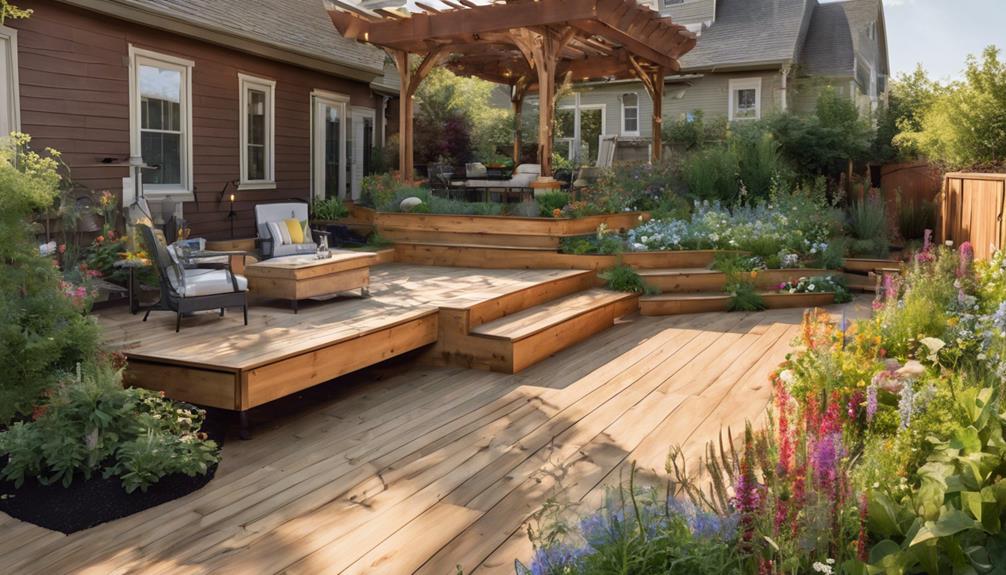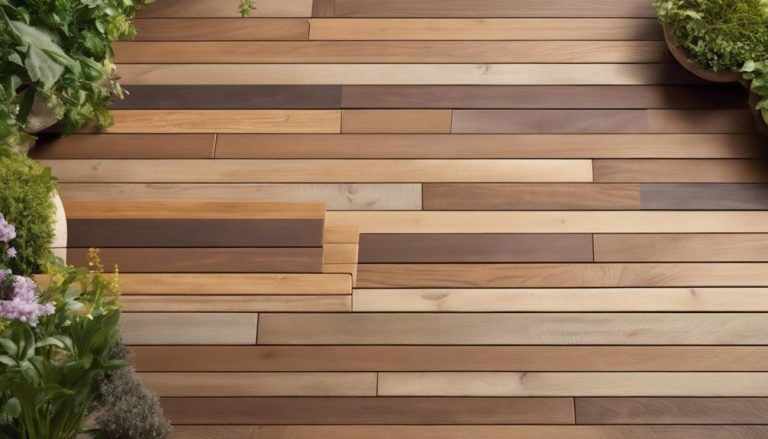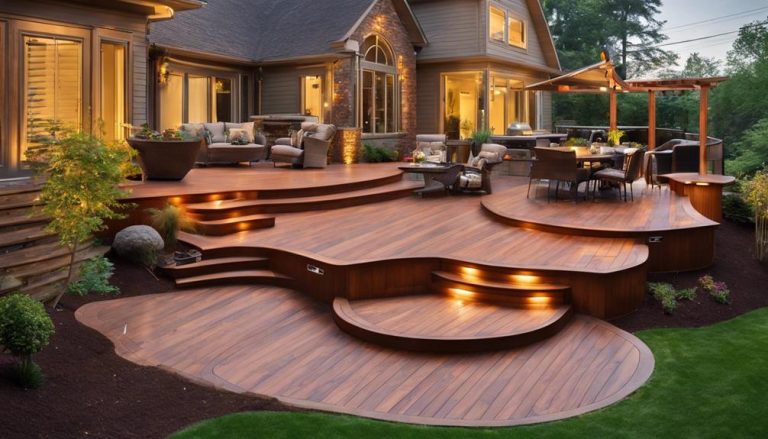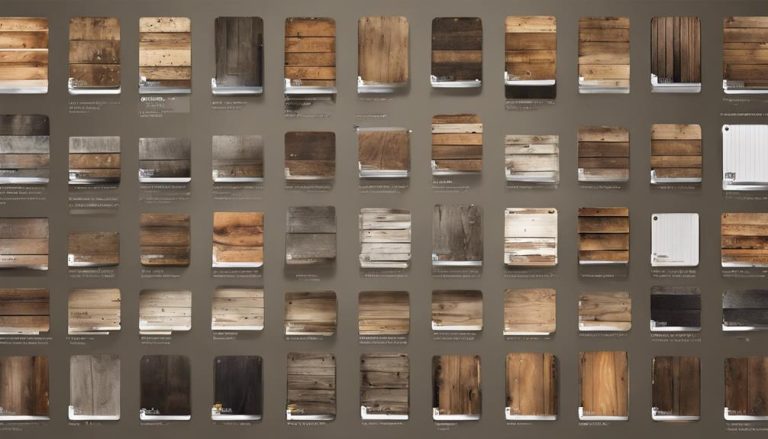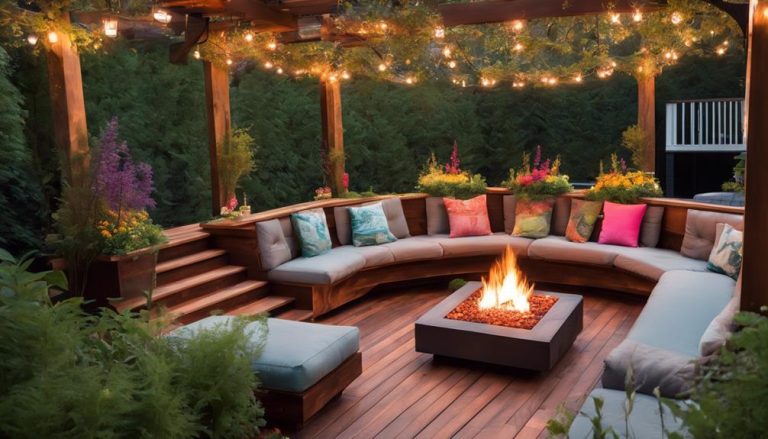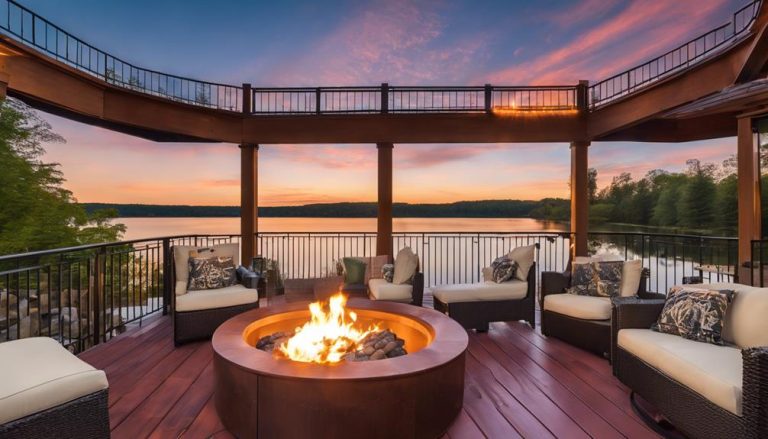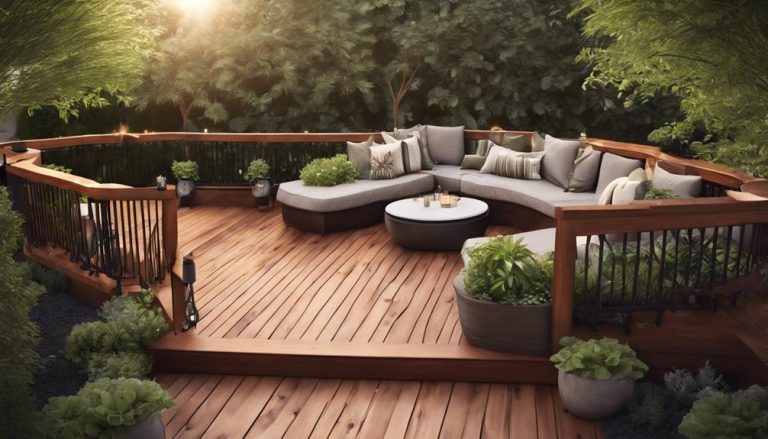What to Consider When Planning a Custom Deck Design
When planning a custom deck design, it's vital to evaluate the available space, factoring in existing landscape features and compliance with zoning regulations to optimize layout functionality. Material selection prioritizes durability and maintenance, balancing aesthetics with budget constraints; pressure-treated wood and composites are notable options. Design styles range from traditional to contemporary, with customization enhancing both visual appeal and utility through multilevel decks and outdoor furnishings. Sustainable materials, including recycled composites, offer eco-friendly benefits alongside long-term cost savings due to durability and minimal upkeep. For a successful deck, one must harmonize design elements with functionality and environmental consciousness. Explore further for extensive insights.
Deck Builder Highlights
- Analyze space requirements including square footage and existing landscape features to optimize deck layout.
- Choose durable materials that align with maintenance preferences and withstand environmental conditions.
- Select a design style that complements your home's architecture and personal taste.
- Ensure the deck enhances property value through quality materials and unique design elements.
- Design the deck to enhance outdoor living, offering seamless transitions from indoors for diverse activities.
What Entails Custom Deck Planning?
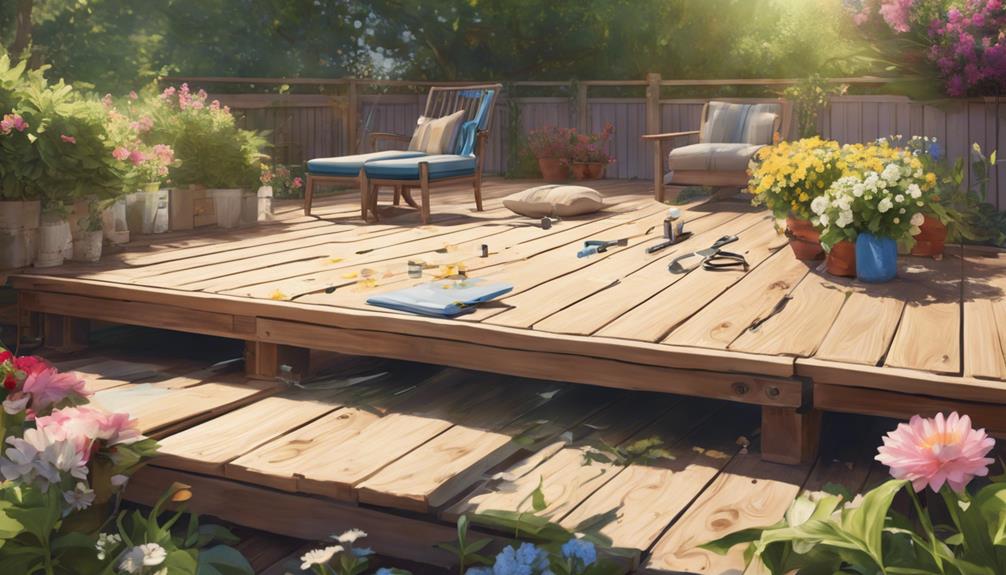
Custom deck planning entails a thorough examination of critical components, beginning with evaluating space requirements to guarantee the deck's functionality aligns with the available area and intended usage. An essential aspect of personalized deck planning is the use of high-quality materials and skilled craftsmanship to confirm the deck is both beautiful and functional.
The process includes a careful selection of materials, which encompasses considerations of durability, maintenance, aesthetics, and budget constraints. Additionally, diverse design style options are explored to seamlessly integrate the deck with the existing architectural elements and personal stylistic preferences, ultimately culminating in a tailored outdoor solution.
Assessing Space Requirements
When designing a custom deck, understanding and evaluating space requirements is paramount to creating a functional and aesthetically pleasing outdoor area. The process begins by appraising the overall square footage available, taking into account both the desired deck size and the existing landscape features that may influence its layout. This includes measuring dimensions and considering the proximity to structures such as the home itself, existing patios, or garden features. Additionally, zoning regulations and property boundaries must be reviewed to confirm compliance with local codes, which often dictate setbacks or height restrictions.
Beyond the basic measurements, it's indispensable to foresee the intended use of the deck to determine spatial functionality. Envisioning specific zones for dining, grilling, lounging, or accommodating hot tubs and other amenities provides insight into how the space should be proportioned. For larger gatherings, ample room for movement and seating arrangements must be factored in, while smaller, more intimate designs may emphasize privacy and integration with natural surroundings.
Furthermore, consider the impact of surrounding elements such as trees and shrubs, which not only influence aesthetic integration but also shade and wind patterns. Thoughtful analysis at this stage lays the groundwork for a harmonious design that meets both practical needs and visual aspirations.
Material Selection Process
In the material selection process for custom deck planning, emphasizing longevity and aesthetics is essential to creating a long-lasting and visually appealing structure. Selecting the right materials hinges on understanding environmental conditions, maintenance requirements, and overall design goals. A delicate balance between these factors guarantees that the deck not only enhances the property's visual appeal but also stands resilient against weather conditions and heavy usage. The material choice profoundly impacts the feel and function of the outdoor space, necessitating informed decisions.
Consider these pivotal aspects:
- Longevity and Strength: Opt for materials known for their strength and resistance to wear, such as pressure-treated wood or composite materials, to ensure your deck withstands the test of time and the elements.
- Maintenance Needs: Choose materials that align with the amount of maintenance you're willing to invest. For example, composite materials often require less upkeep than traditional wood.
- Visual Appeal: The aesthetic contribution of your deck is paramount. Natural woods like cedar offer warmth and character, while modern composites provide a sleek, polished look.
- Cost Effectiveness: Balance your budgetary constraints with quality. While some materials, like hardwoods, might be more expensive upfront, their durability often translates to long-term savings.
Such considerations form the backbone of material selection, shaping the ensuing project's success.
Design Style Options
Building upon the foundation laid by material selection, design style options in custom deck planning further define the character and functionality of the outdoor space. A thoughtfully considered design complements the architectural aesthetic of the home while enhancing the landscape.
Traditional styles often incorporate classic wood railings and balanced, symmetrical layouts that evoke timeless appeal. Meanwhile, contemporary designs may feature minimalist lines, innovative materials like composite decking, and sleek metal railings, establishing a modern ambiance.
In addition, these structures can be custom-fitted with lighting and outdoor furnishings to further personalize the space. Considerations for multilevel decks can optimize the use of sloped and varied terrains, providing distinct zones for dining, seating, and lounging areas.
Incorporating built-in features such as planters or benches can add visual interest and functionality, maximizing the utility and charm of the deck. The thoughtful selection of design styles is integral in crafting a deck that not only aligns aesthetically with the home's existing design but also caters to the homeowner's lifestyle needs.
Benefits
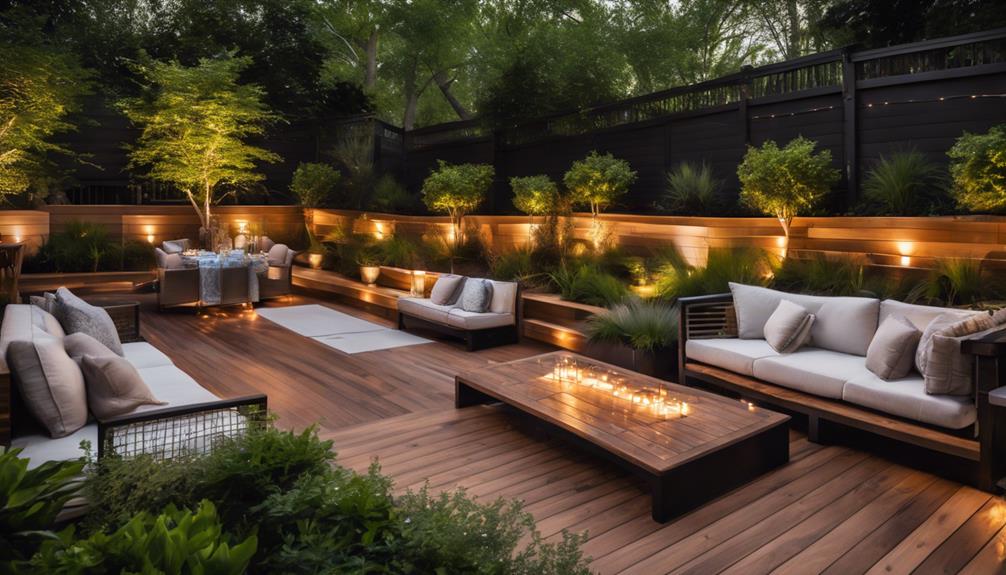
A custom deck design presents a multitude of advantages that not only increase property value but also enrich your outdoor living experience. By offering a personalized aesthetic appeal, it profoundly enhances the visual harmony of your home while creating an inviting space for relaxation and entertainment.
Additionally, cedar decking is known for its environmental sustainability and low maintenance requirements, ensuring you have a durable and renewable option for your deck. Likewise, a thoughtfully designed deck expands your available area for hosting gatherings, providing an ideal setting for social interactions and leisure activities.
Increases Property Value
Enhancing your outdoor space with a custom deck design can markedly elevate your property's market appeal. A well-conceived deck not only merges function with aesthetics but also contributes to increased resale value, making it a prudent investment. Buyers are often drawn to homes that offer outdoor living options, enhancing both lifestyle and property worth.
When considering a custom deck, several elements can illustrate its value-augmenting potential.
- Curb Appeal: An artfully designed deck provides immediate visual enhancement, making your home more inviting and memorable.
- Functional Space: Adding a deck extends usable square footage, which can be a decisive factor for potential buyers prioritizing multipurpose areas.
- Quality Materials: Utilization of high-grade, durable materials can guarantee longevity and low maintenance, a salient point for buyers emphasizing value retention.
- Customization and Design: Unique design elements tailored to your property's existing architecture will make your home stand out in the competitive real estate market.
Investing in a custom deck is strategically aligned with maximizing property value, as prospective buyers are often looking for homes that present both immediate enjoyment and long-term investment prospects. By considering these factors, homeowners can effectively leverage their outdoor spaces to garner increased interest and higher offers.
Enhances Outdoor Living
Beyond increasing property value, a custom deck transforms outdoor spaces into vibrant living areas that boost everyday enjoyment. A deck's strategic design can extend the functionality of a home by providing a seamless shift between indoor and outdoor environments. This allows homeowners to enjoy outdoor living without sacrificing comfort or convenience. Whether hosting social gatherings, dining al fresco, or simply relaxing, a deck offers a personalized space tailored to individual lifestyle needs.
Furthermore, custom decks greatly enhance the usability of one's backyard, creating designated zones for various activities such as entertaining, grilling, or gardening. By incorporating elements like weather-resistant seating, integrated lighting, or even an outdoor kitchen, a deck can become an inviting retreat that encourages time spent outdoors regardless of the season. The thoughtful arrangement of these features can transform an ordinary backyard into a dynamic space that accommodates a multitude of leisure activities.
Additionally, custom decks foster an intimate connection with nature, which has been shown to improve mental well-being while promoting a healthier lifestyle. By considering the environmental conditions such as sunlight exposure, wind direction, and surrounding landscape, a deck design can harness these elements, allowing homeowners to maximize their outdoor living experience.
Boosts Aesthetic Appeal
The elegance of a well-designed custom deck can greatly elevate the visual appeal of any home. With thoughtful integration into the existing architectural framework, a deck can transform the exterior ambiance, providing not only aesthetic allure but also adding significant value to the property. A beautifully crafted deck serves as an extension of one's personal style, offering a blend of natural elements and modern sophistication that captivates the senses.
Consider these compelling reasons why a custom deck boosts aesthetic appeal:
- Harmonizes with Nature: A deck designed with eco-friendly materials and thoughtful landscaping seamlessly merges with the natural surroundings, providing a tranquil outdoor retreat.
- Enhances Architectural Flow: A well-planned deck design complements the architectural style of the home, enhancing its visual continuity and creating a harmonious living space.
- Showcases Craftsmanship: Custom decks highlight exceptional craftsmanship through intricate detailing and quality finishes, reflecting the homeowner's discerning taste.
- Offers Personalized Features: From built-in planters to unique lighting solutions, personalized features can radiate character and charm, making the deck a notable centerpiece.
Through careful design choices and impeccable execution, a custom deck not only beautifies the home but also reflects the homeowner's vision and lifestyle preferences, making it a truly unique asset.
Expands Entertainment Space
A custom deck serves as a versatile platform for expanding your home's entertainment space, easily accommodating a variety of social gatherings. Whether hosting a summer barbecue, a cozy evening under the stars, or a lively birthday celebration, a well-designed deck can transform your backyard into a dynamic hub for entertaining guests.
Beyond just extending your living area, a deck provides a seamless connection between the indoor and outdoor environments, creating an inviting ambiance that encourages guest interaction and relaxation.
Careful planning is essential to maximize this space's potential, taking into consideration factors such as size, layout, and the intended use. For instance, incorporating built-in seating, lighting, and shade structures can enhance both the functionality and aesthetic appeal, making it suitable for daytime and nighttime events alike.
Additionally, the selection of materials plays a crucial role in ensuring durability and comfort, with options ranging from natural wood to composite decking.
Furthermore, a custom deck can cater to diverse entertainment needs by integrating features such as an outdoor kitchen, fire pit, or even a sound system, thereby elevating the hospitality experience. Ultimately, a well-conceived deck enriches both the social atmosphere and the overall value of your home.
Material Options and Sustainability
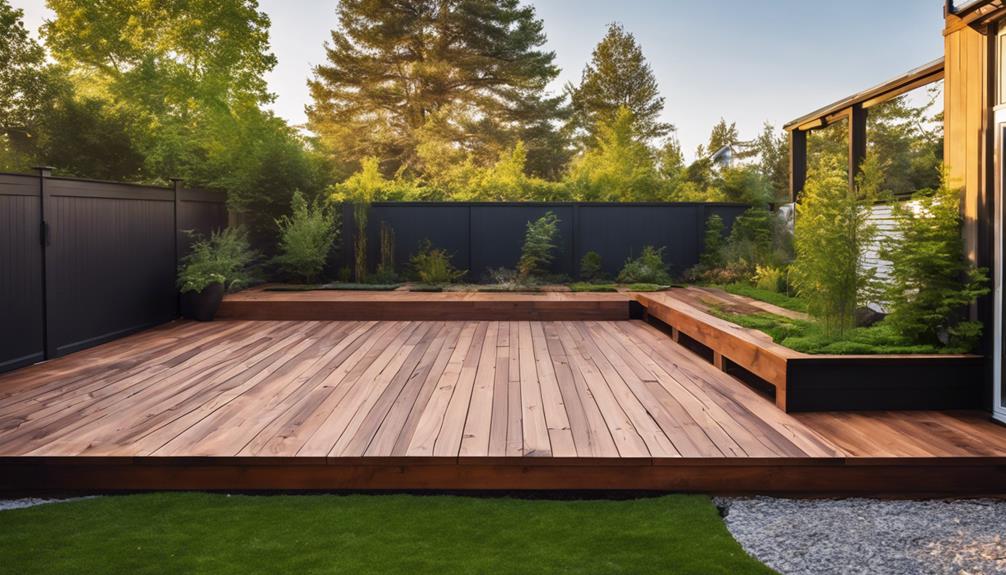
When considering the materials for custom deck construction, it is paramount to evaluate not only the aesthetic appeal but also the environmental impact, durability, and maintenance requirements that each option presents. Eco-friendly deck materials, such as sustainably sourced wood or composites with high recycled content, offer considerable benefits by reducing environmental footprints and often providing greater longevity with less upkeep compared to traditional options. Below is a comparison of various material attributes to assist in making an informed decision.
| Material Type | Key Attributes |
|---|---|
| Sustainable Wood | Renewable, Biodegradable |
| Composite Materials | High Durability, Low Maintenance |
| Recycled Content Decks | Eco-Friendly, Decreases Waste |
Eco-Friendly Deck Materials
Embracing eco-friendly deck materials not only benefits the environment but also enhances the aesthetic and functional value of outdoor spaces. These sustainable choices reduce ecological footprints while maintaining high quality and visual appeal, offering homeowners the chance to enjoy their decks guilt-free. When choosing the material for your custom deck design, consider options that reflect your desire to protect the planet and create a welcoming, beautiful area for relaxation.
Recycled Composite Decking: Made from recycled wood fibers and plastic, this alternative reduces waste and prevents deforestation, while offering the rustic look of wood with enhanced durability.
Bamboo: As a rapidly renewable resource, bamboo is an excellent choice for environmentally conscious builders. Its fast growth rate and strength make it both a sustainable and reliable material for deck projects.
Thermally Modified Wood: This wood undergoes a heating process that enhances its durability and resistance to decay without the use of chemicals, thus contributing to a greener construction.
Reclaimed Wood: Opting for reclaimed wood not only recycles materials but also provides character and history to your deck, creating a unique aesthetic that is both warm and environmentally responsible.
These eco-friendly choices reflect a commitment to sustainability, allowing you to create a deck that is as thoughtful as it is functional.
Longevity and Maintenance Needs
Understanding the longevity and maintenance needs of various decking materials is key for constructing a sustainable and enduring outdoor space. Different materials offer varied lifespans and upkeep requirements, impacting long-term satisfaction and cost-effectiveness.
Hardwood options like teak and ipe provide exceptional durability, often lasting several decades with proper maintenance, which includes regular cleaning and sealing. These natural woods resist warping and decay but require ongoing care to preserve their integrity and appearance.
Composite decking materials represent an alternative that balances longevity and low maintenance. Comprised of wood fibers and plastic, composites resist fading and do not splinter, rot, or require staining. Although slightly higher in upfront cost, composites offer minimal maintenance—typically just periodic washing—over an extensive lifespan often exceeding 20 years.
Additionally, aluminum decking provides an option with supreme resistance to corrosion and the elements, requiring virtually no maintenance and offering a lifespan that may surpass 30 years.
Selecting materials that align with maintenance capabilities and longevity expectations is paramount. Decisions should consider climate challenges and personal commitment to upkeep, as these factors guarantee the deck remains a durable addition to the home. Proper material choice ensures not only enduring visual appeal but also maximizes the deck's utility over time.
Recycled Content Benefits
Incorporating recycled-content materials in deck construction offers substantial environmental and practical benefits, transforming sustainability goals into tangible advantages. These materials, often made from reclaimed wood, plastics, or metal, reduce environmental impact by diverting waste from landfills and minimizing the need for virgin resources.
Recycling content in decking exemplifies an adherence to eco-friendly practices, impressing homeowners and contributing to broader conservation efforts. The ecological advantages are numerous, while the practicality of these products with regards to durability and aesthetics remains uncompromised. Decks built with recycled materials not only showcase innovative design but also reflect a conscientious commitment to sustainable living.
- Environmental Impact: By choosing recycled materials, you directly contribute to reducing landfill waste and lessening the strain on precious natural resources. Each deck built represents a significant step towards a greener planet.
- Cost-Effectiveness: Recycled content often comes at a lower cost than their virgin counterparts, reducing the overall expenditure without sacrificing quality or durability.
- Durability and Low Maintenance: These materials are designed to withstand harsh weather conditions while requiring minimal maintenance, ensuring longevity.
- Versatility in Design: Recycled materials offer a wide range of textures and colors, providing the flexibility to customize decks that harmonize with any architectural style.
Decks FAQ
How Much Should I Budget for a Custom Deck?
Determining the budget for a custom deck requires evaluating material costs, size, design complexity, and local labor rates. Typically, budgets may range from $15 to $50 per square foot, with additional considerations for permits and landscaping enhancements.
What Are the Latest Design Trends for Decks?
Current deck design trends emphasize sustainability and modern aesthetics. Features include eco-friendly materials, multi-level layouts, integrated lighting, and diverse outdoor living spaces, blending functionality with nature. These trends reflect a growing desire for personalized, environmentally-conscious outdoor environments.
How Do I Ensure My Deck Complies With Local Regulations?
To guarantee your deck complies with local regulations, consult your local building department for specific codes, obtain necessary permits, and engage with experienced professionals familiar with zoning laws to integrate safety and compliance seamlessly into your design process.
What Maintenance Is Required for a Custom Deck?
Custom deck maintenance involves regular cleaning, sealing, and inspecting for structural integrity. Wooden decks require periodic staining and sealing, while composite decks need less frequent care. Routine checks for damage, rot, or rust help maintain longevity and safety.
Can I Install Amenities Like a Hot Tub or Outdoor Kitchen on My Deck?
Yes, amenities such as a hot tub or outdoor kitchen can be installed on your deck. However, it is vital to guarantee that the deck's structural integrity and weight-bearing capacity can accommodate these features successfully.

